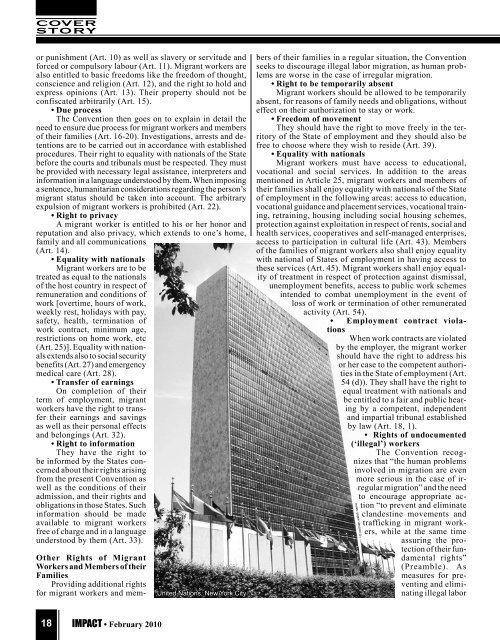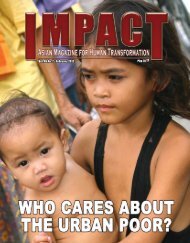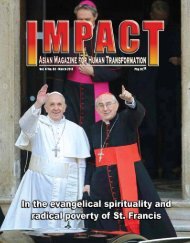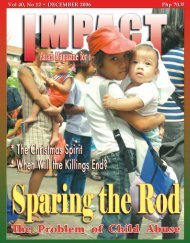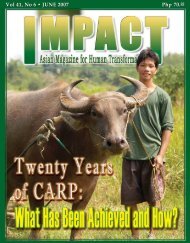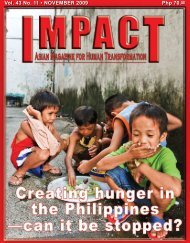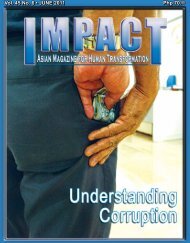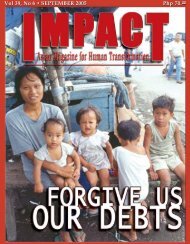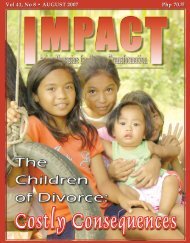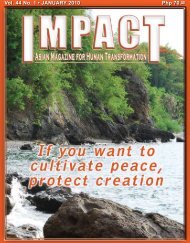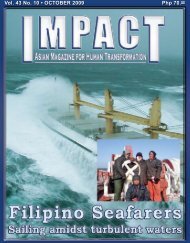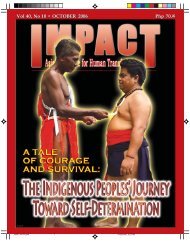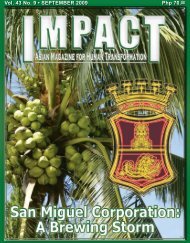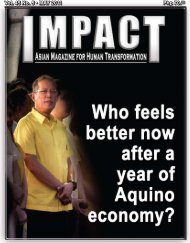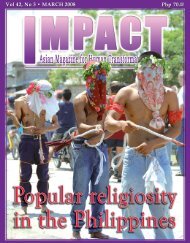Download - IMPACT Magazine Online!
Download - IMPACT Magazine Online!
Download - IMPACT Magazine Online!
You also want an ePaper? Increase the reach of your titles
YUMPU automatically turns print PDFs into web optimized ePapers that Google loves.
COVER<br />
STORY<br />
or punishment (Art. 10) as well as slavery or servitude and<br />
forced or compulsory labour (Art. 11). Migrant workers are<br />
also entitled to basic freedoms like the freedom of thought,<br />
conscience and religion (Art. 12), and the right to hold and<br />
express opinions (Art. 13). Their property should not be<br />
confiscated arbitrarily (Art. 15).<br />
• Due process<br />
The Convention then goes on to explain in detail the<br />
need to ensure due process for migrant workers and members<br />
of their families (Art. 16-20). Investigations, arrests and detentions<br />
are to be carried out in accordance with established<br />
procedures. Their right to equality with nationals of the State<br />
before the courts and tribunals must be respected. They must<br />
be provided with necessary legal assistance, interpreters and<br />
information in a language understood by them. When imposing<br />
a sentence, humanitarian considerations regarding the person’s<br />
migrant status should be taken into account. The arbitrary<br />
expulsion of migrant workers is prohibited (Art. 22).<br />
• Right to privacy<br />
A migrant worker is entitled to his or her honor and<br />
reputation and also privacy, which extends to one’s home,<br />
family and all communications<br />
(Art. 14).<br />
• Equality with nationals<br />
Migrant workers are to be<br />
treated as equal to the nationals<br />
of the host country in respect of<br />
remuneration and conditions of<br />
work [overtime, hours of work,<br />
weekly rest, holidays with pay,<br />
safety, health, termination of<br />
work contract, minimum age,<br />
restrictions on home work, etc<br />
(Art. 25)]. Equality with nationals<br />
extends also to social security<br />
benefits (Art. 27) and emergency<br />
medical care (Art. 28).<br />
• Transfer of earnings<br />
On completion of their<br />
term of employment, migrant<br />
workers have the right to transfer<br />
their earnings and savings<br />
as well as their personal effects<br />
and belongings (Art. 32).<br />
• Right to information<br />
They have the right to<br />
be informed by the States concerned<br />
about their rights arising<br />
from the present Convention as<br />
well as the conditions of their<br />
admission, and their rights and<br />
obligations in those States. Such<br />
information should be made<br />
available to migrant workers<br />
free of charge and in a language<br />
understood by them (Art. 33).<br />
United Nations, New York City<br />
Other Rights of Migrant<br />
Workers and Members of their<br />
Families<br />
Providing additional rights<br />
for migrant workers and members<br />
of their families in a regular situation, the Convention<br />
seeks to discourage illegal labor migration, as human problems<br />
are worse in the case of irregular migration.<br />
• Right to be temporarily absent<br />
Migrant workers should be allowed to be temporarily<br />
absent, for reasons of family needs and obligations, without<br />
effect on their authorization to stay or work.<br />
• Freedom of movement<br />
They should have the right to move freely in the territory<br />
of the State of employment and they should also be<br />
free to choose where they wish to reside (Art. 39).<br />
• Equality with nationals<br />
Migrant workers must have access to educational,<br />
vocational and social services. In addition to the areas<br />
mentioned in Article 25, migrant workers and members of<br />
their families shall enjoy equality with nationals of the State<br />
of employment in the following areas: access to education,<br />
vocational guidance and placement services, vocational training,<br />
retraining, housing including social housing schemes,<br />
protection against exploitation in respect of rents, social and<br />
health services, cooperatives and self-managed enterprises,<br />
access to participation in cultural life (Art. 43). Members<br />
of the families of migrant workers also shall enjoy equality<br />
with national of States of employment in having access to<br />
these services (Art. 45). Migrant workers shall enjoy equality<br />
of treatment in respect of protection against dismissal,<br />
unemployment benefits, access to public work schemes<br />
intended to combat unemployment in the event of<br />
loss of work or termination of other remunerated<br />
activity (Art. 54).<br />
• Employment contract violations<br />
When work contracts are violated<br />
by the employer, the migrant worker<br />
should have the right to address his<br />
or her case to the competent authorities<br />
in the State of employment (Art.<br />
54 (d)). They shall have the right to<br />
equal treatment with nationals and<br />
be entitled to a fair and public hearing<br />
by a competent, independent<br />
and impartial tribunal established<br />
by law (Art. 18, 1).<br />
• Rights of undocumented<br />
(‘illegal’) workers<br />
The Convention recognizes<br />
that “the human problems<br />
involved in migration are even<br />
more serious in the case of irregular<br />
migration” and the need<br />
to encourage appropriate action<br />
“to prevent and eliminate<br />
clandestine movements and<br />
trafficking in migrant workers,<br />
while at the same time<br />
assuring the protection<br />
of their fundamental<br />
rights”<br />
(Preamble). As<br />
measures for preventing<br />
and eliminating<br />
illegal labor<br />
© norman.walsh.name<br />
18<br />
<strong>IMPACT</strong> • February 2010


